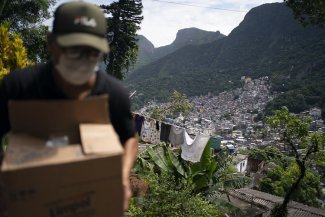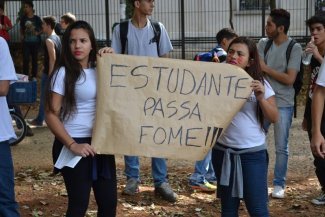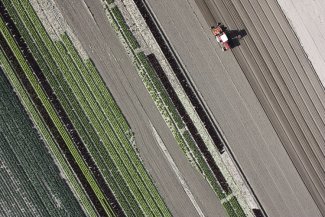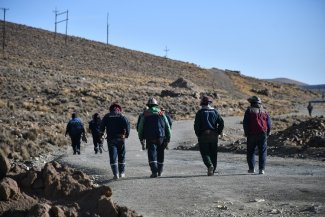Over the past two years, the queues in front of food distribution points across the country have grown longer. Here, in front of the Sé Cathedral, in one of the main squares in central São Paulo, 500 hot meals are distributed on weekdays by the Homeless Workers’ Movement (MTST). 5 September 2022.
“Many of the children we welcome here are undernourished,” says Simone Rego, a Brazilian teacher who runs Academia Carolinas, a small, self-managed socio-cultural centre on the outskirts of São Paulo. Children from the neighbourhood come several times a week, after school, to take part in the recreational activities, to receive extra tuition and, above all, to enjoy the free meals. “Giving access to healthy and balanced meals is our main focus. These children come from large families, with three or four children, sometimes up to 10, and from homes where there is not enough to eat for everyone. Seeing them eating so avidly and then asking if they can take something home for their siblings speaks volumes about what the families here are going through,” she continues.
Located on the fringes of the huge metropolitan area, more than a two-hour journey from the centre, Cidade Tiradentes is one of the poorest neighbourhoods in Brazil’s economic capital. Almost 80 per cent of the houses surrounding Academia Carolinas, housed in a former cafeteria, are illegally built wooden shacks without access to running water. The adjacent stream serves as a sewer and electricity is supplied by makeshift hook-ups that have been known to cause fires. And, above all, there are next to no public services in these informal and overcrowded settlements, a reality shared by millions of Brazilians throughout the country.
“The pandemic has affected the few public services that are available and people have lost their jobs. To access emergency aid, you have to be able to read, have internet access and an official address, which is not the case for many people here,” says Rego, who started out by going with a few volunteers to help families who had been left destitute and weren’t able to apply for social assistance on their own. Having witnessed the misery they were living in, she went on to open a place for young people, a year and a half ago, a “refuge”, in her words, from the violence of everyday life.
The ‘return of hunger’, accentuated by the health and economic crisis
Today, according to the Brazilian Research Network on Food Sovereignty and Security (Rede Penssan), some 33.1 million people are experiencing severe food insecurity, in other words, they do not have enough to eat on a daily basis. This figure has been widely quoted by the candidates and the media during the weeks of political campaigning in the run-up to the general elections on 2 October. In December 2020, the same figure was 19.1 million. The increase is spectacular. More broadly, according to Rede Penssan, some 125 million people are affected by some degree of food insecurity. The ‘return of hunger’ in Brazil is clearly an indicator that is worrying analysts and social actors as well as the families affected.
Fernanda is 33 years old and has four children, including a three-month-old baby. She has come with her pushchair to ask for a ‘marmita’, a takeaway meal, distributed on this Monday in September by an association in the centre of São Paulo. She lives in a squatted building, not far from the Sé square. “We have no water, no fridge, no stove. It’s impossible to cook where I live,” she says.
“I’m also able to save time thanks to the meals distributed, because I take care of the children on my own. I have already gone for days without eating and it is not easy, because I am breastfeeding,” she adds, without seeming to complain.
Within minutes, 500 marmitas had been distributed in the square by the Homeless Workers’ Movement (MTST). On the menu: rice, black beans, sausage and cassava farofa: the ingredients of Brazil’s staple dish, feijoada. MTST is a grassroots movement that started fighting for the right to housing 20 years ago, but faced with the food insecurity caused by the pandemic, mainly on the outskirts of the cities, where it is most active, it recently launched a network of ‘solidarity kitchens’, where members of the movement cook on a voluntary basis for those in need, from Monday to Friday.
“Initially, we distributed the basic needs basket [cesta básica, in Portuguese]. But we soon realised that many people weren’t able to cook at home. With inflation, the price of a bottle of gas has tripled in recent months. So, we changed our approach and now we distribute pre-prepared meals,” explains Cécilia Gladchi, one of the coordinators of the project, which now has 32 solidarity kitchens throughout Brazil (including seven in São Paulo), financed by private donations, like the free meals provided by the Academia Carolinas.
An election campaign issue
According to the UN Food and Agriculture Organization (FAO), Brazil has taken a 20-year step backwards, returning to food insecurity figures comparable to those of the 1990s, despite having removed itself from the Hunger Map in 2014, thanks to targeted social assistance policies (Fome Zero, Bolsa Familia, etc.) and a favourable economic environment. The coronavirus pandemic, which claimed over 600,000 lives, has drastically increased the rate of poverty, along with several years of recession, which the economy is only just emerging from, with inflation reaching 10 per cent year-on-year and unemployment peaking at 14 per cent in 2021 before falling back to 9.1 per cent.
These are figures that the outgoing president, Jair Bolsonaro, does not want to hear. On 26 August, he denied the fact, for the second time, that his fellow citizens might really be going hungry. He had already, during his mandate, called into question the number of deaths from Covid-19 and the figures on deforestation. This has not, however, stopped him from trying to limit discontent with a battery of emergency social aid packages released in the run-up to the elections. On the other side, the left-wing candidate and former president Lula da Silva is doing precisely the opposite, reminding anyone willing to listen of his own experience of hunger during his poverty-stricken childhood and fully playing on the promise of a return to the years of prosperity enjoyed during his and his party’s rule (2003-2014).
But the road ahead looks set to be long, given the many structural problems affecting the country’s domestic economy.
In November 2021, Bolsonaro’s government converted the emergency aid of the pandemic phase (Auxilio emergencial) into longer-term social assistance (Auxilio Brasil). But the R$600 (around €120) a month of public aid is seen as insufficient by many in Brazil, given the rising cost of living.
One of the major socio-economic issues is the cap on public spending, which was approved for a 20-year period by Michel Temer’s government (and then enshrined in the constitution), and which now restricts all public policies designed to assist the most vulnerable. The federal budget for food aid, for example, has been slashed, going from almost R$586 million in 2012 to just R$58.9 million in 2021.
In January 2019, the Bolsonaro government eliminated the National Council for Food and Nutritional Security (CONSEA), a multi-stakeholder body in which civil society was able to participate in the development of public policies on the matter. In 2010, thanks to the work of this Council, the‘right to adequate food‘ was enshrined in the constitution. The government’s official justification for repealing this constitutional amendment was its “infringement of executive powers”. In other words, although the CONSEA had been working perfectly well for 15 years, taking on board the voices of small farmers and Indigenous peoples, it was now getting in the way of the presidential agenda.
Action taken by Brazilian states on access to food
Although the federal state does not always deliver, state governors are able to pursue their own policies in certain areas. This was seen during the Covid-19 pandemic, when several governors took the measures needed to protect and vaccinate the local population, while, from Brasilia, President Bolsonaro refused to put the economy on hold for what he called “a little flu”. The state governorships will also be at play in the October elections.
The north and north-east of the country are the regions of Brazil most affected by hunger (25.7 per cent and 21 per cent of the population, respectively, and as much as 60 per cent in rural areas). In Maranhão, the state governor, Flávio Dino (elected representative of the Communist Party of Brazil, PCdoB, now standing as a candidate for the Federal Senate in the 2 October elections) implemented a vast food programme for people living in the poorest areas during his two terms in office (2014-2022).
The largest of the 150 ‘community restaurants’ in the north-eastern state of Maranhão is in the João de Deus district of the capital, São Luís. Three times a day, a long queue forms in front of the virtually brand new establishment.
Almost 1,000 full meals are served here for just R$1 (around €0.19), a symbolic amount that everyone can afford and applies to everyone, with no justification required. Across the state as a whole, this amounts to some 100,000 meals a day.
Although community restaurants exist elsewhere in Brazil, each with their own formula, the largest network is in Maranhão. “And 48 more are opening soon,” says Rafael Bernal, project coordinator at the local secretariat for social development. Moreover, at least 30 per cent of the food has to come from small local producers. “But more often than not it is as much as 100 per cent, in some places,” adds the coordinator.
José is sat at a table with his wife and three-year-old daughter. A motorbike taxi driver by profession, he explains that he comes here two or three times a week. For him, it not only eases his financial situation but also saves him time, as his working days are long. Around them are families and many men in work clothes. “There are lots of manual workers. They come here because they need to eat well for the physical work they do,” observes Cristianne Pereira da Costa, a nutritionist and public sector employee who provides free consultations in a small office next to the canteen.
In addition to providing affordable meals, these community kitchens also focus on education about eating well, with balanced meals that contain less fat, sugar and salt. “This does not always appeal to the palates of Brazilians, who are used to excess,” says the nutritionist. Brazil is, indeed, facing the paradox of a population that is undernourished yet overweight (one in two people were overweight in 2021).
Food, a cultural issue to be redefined
Eating better, eating local, eating traditional and rethinking the production-oriented agricultural model that is too focused on exports. These are the battles that Claudia Visoni has been fighting for several years. An environmental activist, she is running on a joint list for the São Paulo state parliament under the banner Alimenta SP, Feed SP, (affiliated to the Green Party). “Healthy food for all is the most serious issue of the day and yet we are the only candidates prioritising this issue,” she explains, while leafleting on the city’s main thoroughfare, Avenida Paulista, on a Sunday in September.
Her candidacy is an extension of the work she does with the Food Front (Frente Alimenta), set up during the pandemic to organise the redistribution of local farmers’ surpluses to solidarity kitchens and to promote virtuous partnerships. “The solutions are there, and they have been proven, but now they have to be converted into public policies,” she says.
She also wants better support for local producers and is opposed to cash crop monoculture. “When I go to inland Brazil, all I see are fields of sugar cane, soy and eucalyptus. Where are the rice and beans? It’s time we produced food for the people of Brazil and less for the pigs of China.” She also points to the associated cultural impoverishment she is witnessing. “Our food traditions are being destroyed by globalisation. Mothers no longer know how to cook native plants.” That is why the Food Front has started offering cooking classes too, in places like the Académia Carolinas, in Cidade Tiradentes, where mothers can learn the basics about a new way of cooking while their children play.













